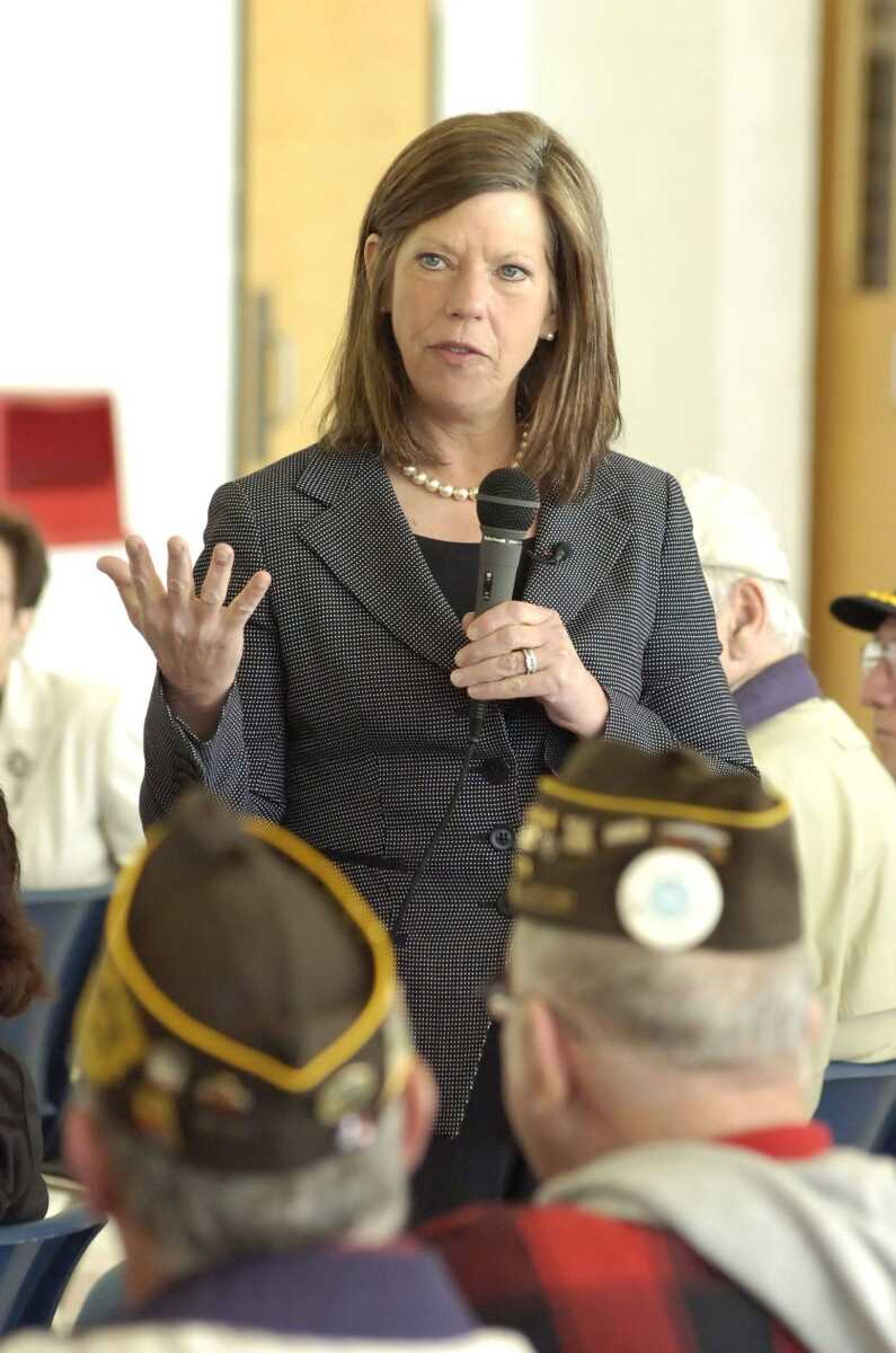Health reform will pass, but climate bill will only generate debate, Emerson predicts
Congress is more likely than not to pass some form of health care legislation after it returns to work next week, U.S. Rep. Jo Ann Emerson said Wednesday. But a climate control bill attacked as a penalty on coal-dependent Midwestern states and a federal deficit expected to pile up $9 trillion in debt over the next 10 years are issues that will generate a lot of debate but no resolutions, Emerson predicted...
Congress is more likely than not to pass some form of health care legislation after it returns to work next week, U.S. Rep. Jo Ann Emerson said Wednesday.
But a climate control bill attacked as a penalty on coal-dependent Midwestern states and a federal deficit expected to pile up $9 trillion in debt over the next 10 years are issues that will generate a lot of debate but no resolutions, Emerson predicted.
In an interview at her Cape Girardeau office, the seven-term Republican lawmaker said she's convinced big savings are available to the federal government that could shrink the budget deficit. Simple measures, such as watching how money is spent on office supplies, could make a big difference, she said.
Broader aims, including her crusade to force drug companies to negotiate Medicare prescription prices with the federal government, could result in dramatic savings, said Emerson, a Cape Girardeau Republican.
As she explained how the savings could be achieved, Emerson, a member of the House Appropriations Committee, said the Department of Homeland Security found that it could save $42 million over five years by purchasing office supplies from Staples rather than through the federal procurement agency, the General Services Administration. A stapler, for example, cost $10.47 through GSA and $6.17 at the retailer.
"So if you are buying millions of staplers for people who work in this government, why wouldn't you get a reduced rate?" she said. "Why would it cost $10.47?"
Emerson said a Congressional Budget Office inquiry into the cost differences is underway and that she knows of many opportunities for savings.
"I went absolutely apoplectic. We checked out pens, we checked out staplers and we checked out other things and there were huge, substantial differences," Emerson said.
The prescription drug program for Medicare costs $49 billion annually. Emerson wants negotiated prices, a law allowing drugs to be reimported from Canada and an end to policies that result in U.S. consumers subsidizing prescription costs in foreign countries.
"We are talking tens of billions of dollars in just that alone over five years," she said.
The debate over health care, President Barack Obama's top priority, has been changed by the anger on display at town hall meetings held by Democratic lawmakers. Obama has all but abandoned proposals for a "public option" plan to be included in the coverage to be offered.
Aye vote not ruled out
Emerson did not rule out voting in favor of a health care bill. The essential elements needed in any bill that could win her vote, she said, are insurance reforms. The reforms she listed include a ban on companies denying coverage for pre-existing conditions, eliminate lifetime caps on benefits, remove provisions that effectively result in discrimination based on age or gender and, most importantly, a federal law that takes control of health insurance regulation from the states.
That's important, she said, because it would allow insurance to be portable across state lines.
To expand coverage further, Emerson said, the income test for Medicaid should be increased to 133 percent of the federal poverty level as an incentive to work. That would mean a single person earning less than $14,400 would be eligible and a family of four with an income of $29,326 or less would be eligible.
"There are a lot of people who don't work today because they need insurance," Emerson said.
As Obama and the Democrats consider replacing the public option with insurance cooperatives, Emerson said she sees promise in the idea. "If you add the co-op concept to that and if the co-op is done kind of like, probably Minnesota is the best example, that could be workable, that adds another option," she said.
Co-ops, voluntary associations, have resulted in lower premiums for members in Wisconsin and Minnesota in part because they are not for-profit businesses.
Emerson said she will not decide to vote for or against a health care bill until it reaches her in a final form.
Cap-and-trade
The climate-control legislation known as cap-and-trade is generating bipartisan opposition from Midwestern states with a heavy concentration of utilities that depend on coal and with large agricultural communities.
Cap-and-trade imposes fees for permits allowing a set level of carbon emissions. Companies that do not exceed their permitted level may sell them to others. Companies that exceed the limits may buy the credits or install improved pollution controls.
Both cost money, costs that will show up on consumer's bills, she said.
For farmers, the heavy dependence on fossil fuels for planting, harvesting, fertilizers and grain drying, among others, mean huge new costs as the price of those fuels and products rise.
While some people can afford to invest in new appliances or other means of saving energy and reducing their costs, too many people will see their bills rise to unsustainable levels, she said.
Instead, Emerson said the emphasis should be on tax incentives to encourage conservation, rather than financial penalties.
"We can't wind, solar and electric-car our way out of the use of fossil fuels right now," Emerson said. "It is just not possible."
rkeller@semissourian.com
388-3642
Pertinent address:
U.S. Capitol, Washington, D.C.
Connect with the Southeast Missourian Newsroom:
For corrections to this story or other insights for the editor, click here. To submit a letter to the editor, click here. To learn about the Southeast Missourian’s AI Policy, click here.











